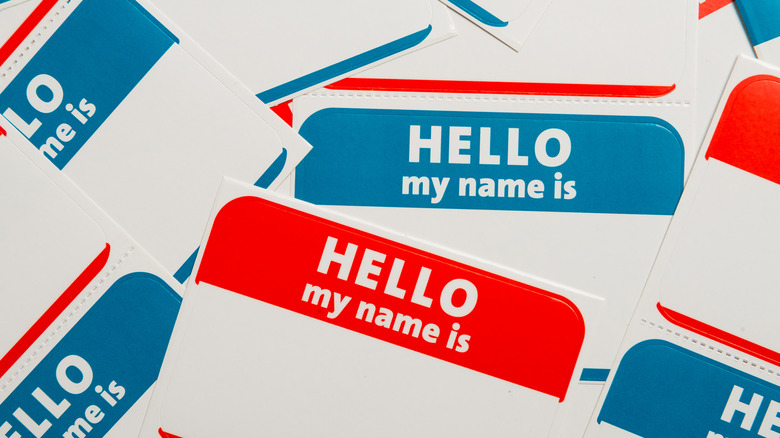14 Subtle Hacks To Win People Over
Let's face it — deep down, we all hope that people like us. Whether we're meeting new people at a party, starting a new job, or even catching up with old friends, it's always nice to make a good impression.
Knowing how to win people over, whether they're friends or colleagues, can be a useful skill as you go through life. Once you've won people over, you will be more likely to have healthy, fulfilling relationships. You might also be more likely to succeed in both the social and the work spheres. Winning over a new friend, for instance, might mean you get invited to exciting new social events. Winning over a boss might lead to a smoother work life or even a promotion. In short, winning people over can make your life easier and, hopefully, filled with more success and fulfillment.
Here's a guide to some quick hacks that will help you win more people over, as explained by scientific research and experts.
1. Ask questions
One of the easiest ways you can influence another person's opinion of you is to pepper a few thoughtful questions into your conversation. Many people assume that talking about themselves is a good way to win someone over, it's usually better to ask them some questions, too. In fact, a 2017 study by the Association for Psychological Science found that asking questions increases your likability.
"It takes the focus off of you and onto the other person, which immediately makes you less self-involved and more likable," explains Susan McLennan, who works with business leaders to develop strong relationship skills. "Asking questions tells the other person that you are very interested in everything they are and have to say."
Lisa Mirza Grotts, an etiquette expert and relationship coach, suggests asking questions that encourage the other person to open up. "Ask questions that garner responses other than a yes or a no," Grotts tells us. This way, the other person will feel leave the conversation feeling that you shared a strong rapport.
2. Actively listen
If you want people to like you and trust you, become a good listener. This doesn't just mean giving the other person time to speak — it means taking in what they say and showing that you've understood it. Active listening and reflective responding are techniques often used in training psychiatrists and other mental health services (via the American Psychological Association). However, it can also be a useful technique to employ in everyday life.
In order to become a good listener, practice repeating what the other person said in your own words. "You want to bring your whole attention to your conversation and one of the ways that you ensure that your brain is really taking in what you're hearing is to reflect on and respond to what you are hearing," suggests Susan McLennan. "This prevents you from drifting off into one of the tens of thousands of thoughts vying for your attention in a day. It also signals that you are committed to this conversation and to learning more about the person you are talking to."
These days, it's easier than ever to drift off while we're speaking to our friends and colleagues. You may find yourself thinking about your to-do list or your weekend plans. By focusing all of your attention on listening, you'll impress others — and win them over — with your ability to focus on them.
3. Remember details from previous conversations
Another great way to win people over is to make them feel that you have built a strong relationship that is meaningful to you. This will make the other person feel positive about your relationship and they'll find themselves wanting to spend more time with you. Make an effort to remember details from your previous conversations to further strengthen your relationship, and bring them up at your next meeting. Remember what they told you they were going to do on the weekend, what they were working on, what they were worried about, and so on.
"Remembering details from previous conversations immediately demonstrates that you value the relationship and the person's interests and experiences," notes Dr. Bruce Bassi, M.D., a psychiatrist from Jacksonville, Florida. "This is especially true the smaller the details are."
Susan McLennan also weighs in on this skill. "Following up with specific questions about projects and people they mentioned helps the other person understand that you didn't just pass time with them, you invested it. That conversation meant something to you, which makes it much more likely to make the whole of the relationship mean more to them, too," says McLennan.
4. Pick up communication habits from the other person
A great way to win someone over is to make them feel comfortable and understood when they're around you. A 2020 study in Administrative Science Quarterly explored how a technique called "linguistic mirroring" can help. Linguistic mirroring is a process that involves picking up on the other person's linguistic habits and mirroring them.
"Take your cue from the other person," says Susan McLennan. "Do they speak in short, punchy sentences? Do they use humor or stories to get a point across? Do they like to get in and out of a conversation quickly or do they like to spend a significant amount of time with each person?" Take note of how they like to communicate and reciprocate. By imitating their habits, they'll feel like you have a stronger connection, and in turn, they'll want to spend more time with you in the future.
5. Practice good eye contact
An easy hack to win people over is simply to make eye contact. Obviously, you don't want to stare the other person down, but by focusing on holding a normal amount of eye contact during your conversations, you'll help them to feel that they're getting all your focus. In 2018, Frontiers in Psychology carried out a review of a number of scientific studies and noted that good eye contact may trigger the reward centers in the brain. Some people even believe that prolonged eye contact can help romantic couples fall in love. According to Forbes, you should aim for around 30% to 60% eye contact during a conversation — more while listening — to leave the other person feeling positive about the interaction.
"The eyes have it and speak non-verbally for us," says Lisa Mirza Grotts. "If someone is talking to you and you look directly at them, seem interested, and engaged, you're sending the right message." Dr. Bruce Bassi also agrees. "Good eye contact conveys confidence, respect, and interest in the conversation, while also helping to establish a sense of trust," says Bassi.
6. Keep your phone on the table
A very important hack to remember is to try to separate yourself from your phone during conversations. Nothing will turn someone off faster than someone who is constantly distracted by a buzzing phone — it's a phenomenon known as "phubbing." Using your phone while you're talking to someone can make them feel like you'd rather be elsewhere — and that you're not that interested in what they have to say.
A 2012 study published in the Journal of Social and Personal Relationships noted that even having phones present during conversations can diminish the quality of the conversation and make those involved feel less positive about how things went.
"Nothing says I am only half listening to you like a device on the table screaming, 'I am more important than you and may interrupt you at any moment!' Susan McLennan warns us. "Be with the person you're with. Otherwise, you are literally hedging your bet and signaling that they are only important until someone more important makes a bid for your attention." So, if you want to win people over, it's probably time to tear yourself away from your phone and turn it off.
7. Find common interests
If you want to win someone over, finding a common ground between you is a great place to start. Common ground can include shared interests, common friends, or even shared knowledge and skills. Finding a common ground will help you feel more comfortable with new people and will make them feel more connected to you.
As Susan McLennan tells us, it's almost always possible to find something — even if it doesn't immediately seem like you have much in common. "Even people who are diametrically opposed to each other on matters of politics or social issues can often find common ground around interests," McLennan says. "Picking up a thread from something the other person has said and asking follow-up questions may well lead you to a common appreciation for something or a shared hobby, which can be an opportunity to spend more time together in a follow-up get-together."
8. Give small, personalized gifts, just because
Another great way to make a positive impression is to make small, thoughtful gestures. While birthday and Christmas presents are great, it can also help to give the occasional random gift — just because. We're talking about a random coffee, a snack, some flowers, or even a small unique gift like a book or a sweater. This small gesture will be a welcome surprise that shows you respect and care about the other person. Plus, it will hopefully help to put you in your friend or co-worker's good books.
Get creative about the little gifts you give. "Small gifts are just thoughtfulness in action. They don't even have to cost money," says Susan McLennan. "I had a mentor who lived by the sea and would sometimes bring me shells from her walks. The shells were sometimes quite beautiful, but more importantly, she was telling me through her actions that even when we were not together, she was thinking of me."
Remember to use your best judgment about which gifts are appropriate — try not to freak the other person out with an unnecessarily large gift!
9. Use the other person's name more in your conversations
Looking for a quick and easy hack to quickly win over a few more people? Make an effort to sneak their name into your conversations a little more often. When they hear their name, they'll feel more important and more understood. In fact, according to a piece in The Washington Post, more people have won over customer service reps and nurses by using their names.
Susan McLennan notes that it can also be an effective technique when you're speaking to people you know a little better, too. "As your friendship develops, using a person's name is a sign of respect," McLennan says. "It reinforces that this is not a conversation you would or could have with just anyone; it is with and for them. People are much more likely to remember you when you use their name."
Again, it's important not to get creepy with this hack — use it sparingly. As Dr. Bruce Bassi says: "Be careful not to overdo it, and be mindful of your tone when saying their name."
10. Create inside jokes
As your relationships develop, having a few shared, running jokes with the other person will help the relationship feel stronger and more intimate. Whether it's a friend or a co-worker, a few inside jokes can definitely help to win them over. The Family Institute at Northwestern University noted that inside jokes can help to repair and maintain romantic relationships, but they can also be effective in building non-romantic relationships, too.
"Creating inside jokes can be a fun way to strengthen a bond by creating a sense of shared experience and humor," explains Dr. Bruce Bassi. It can also be a way to create emotional memories. "If they don't remember details of the interaction later, at least they will remember how they felt when spending time with you," Bassi says.
But be careful not to "show off" your inside jokes when you're around others. "Inside jokes work when the humor is understandable to those on the inside. If not, it can alienate others in conversation," warns Lisa Mirza Grotts.
11. Have productive, honest arguments
In most relationships, there will always be a few disagreements. Instead of trying to avoid conflict altogether, it can be helpful to learn a few strategies to argue well. In fact, if you can argue in a healthy, productive way, you can still win people over, even while you're in an argument.
We recommend self-editing. Think about your phrases before you speak, especially during arguments. This will help you avoid being overly offensive or cruel while fighting. Give the other person space and time to make their points, listen, and respond carefully.
If you learn how to have healthy arguments, you might even find that your relationships grow. "Great friendships grow through the discussion of ideas," says Susan McLennan. "Inevitably, you will differ with your new friend on some of those ideas. You want your honesty and authenticity to shine through and not be taken by some misguided desire to be right. Disagreements strengthen a friendship. They signal resilience and they expand its edges and scope." As Dr. Bruce Bassi adds, this kind of arguing might even help you and the other person reach a "common ground."
12. Get deep
People tend to feel more seen and valued when others take interest in who they are as people on a deeper level. Getting a little deeper into your conversations and learning about their values, histories, families, and fears can lead to the other person appreciating your presence even more.
As Susan McLennan puts it: "Popcorn is lovely but it doesn't make a meal. It's the same with banter and pleasantries." In order to make a real impression and win people over in a meaningful way, try getting a little deeper. "Over time, you want to be able to have more robust discussions around things that matter," McLennan says. "Deepening your ideas and your discourse will deepen your friendship."
However, be careful not to get too deep too fast. "Thought-provoking questions are good, but make sure you stay in your own lane and not get too personal," says Lisa Mirza Grotts.
13. Tell the other person you like them
Studies have shown that by simply telling someone you like them, you'll increase your own likability. If you want to win someone over, don't be shy — tell them you like spending time with them, that you like their ideas, or that you simply like their style. After all, people like compliments. They make them feel good — and they'll want to spend more time with you if spending time with you makes them feel that way.
"If you genuinely like someone, telling them can further a friendship more quickly," Susan McLennan tells us. "But make sure you are sincere. Most people like to be liked and it saves them from wondering, which may lead to a more open and relaxed conversation."
Of course, be careful not to scare the other person away. If you don't know them that well, stick with small, casual compliments rather than any over-the-top declarations.
14. Be kind about others and avoid nasty gossip
Even though sharing secrets can be fun and, in some cases, can strengthen your relationship, tread carefully when it comes to gossip. Being a notorious gossip is a surefire way to make people distrust you and even dislike you. Especially when you enjoy mean gossip about others. "Gossip is one of those things that can feel good in the moment but it's a losing game," Susan McLennan shares. "People will inevitably wonder what you are saying behind their back and will be guarded with you. Cruelty to others and gossip shut down friendships and will ultimately leave you on the outside of a growing number of circles."
If you want to win someone over, avoid spreading gossip in their presence. As Dr. Bruce Bassi notes, gossiping can be a red flag and can actually make people feel uneasy in your presence. "Avoiding gossip demonstrates to the other person you would not gossip about them to other people."
If you do enjoy the odd gossip, try to keep it friendly and kind-spirited. For instance, telling an anonymous story about someone unconnected to the other person can make for a fun anecdote. On the other hand, gossiping about a mutual friend can make you come across as untrustworthy and judgmental. So, if you want to gossip, tread carefully.














